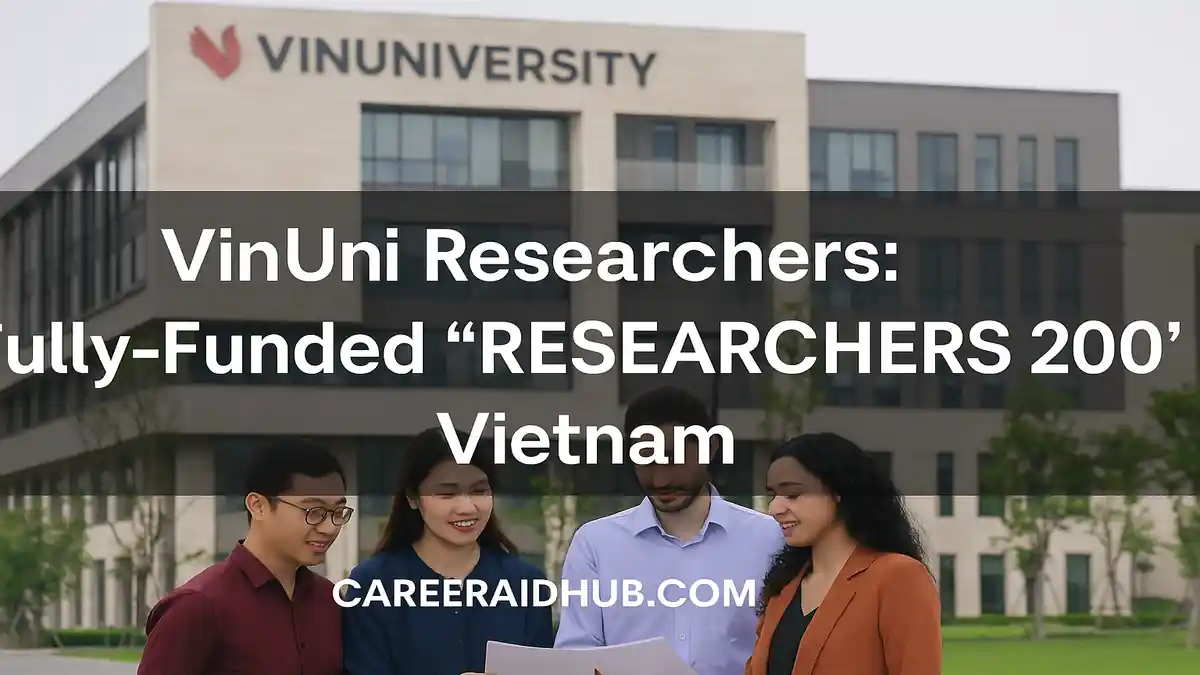HRDG–Nehru Science Postdoctoral Research Fellowship: A Complete Guide for Aspiring Researchers
India’s research and development landscape has grown significantly over the last decades, with the Council of Scientific and Industrial Research (CSIR) serving as one of the most important contributors. CSIR, operating 37 advanced laboratories across the country, produces thousands of publications, patents, and innovations each year. To strengthen this ecosystem further, CSIR, through its Human Resource Development Group (HRDG), established the Nehru Science Postdoctoral Research Fellowship. This fellowship was created with the vision of nurturing young scientists who have recently completed their doctoral studies. It provides them with not only financial support but also mentorship, laboratory resources, and exposure to high-impact research environments. By bridging the critical gap between doctoral research and independent faculty positions, the program ensures that India retains and empowers its brightest scientific talent.
The CSIR–Nehru Science Postdoctoral Research Fellowship supports outstanding PhD holders with a generous stipend of ₹80,000 per month, an annual contingency of ₹3 lakh, and access to CSIR’s world-class laboratories. This fellowship empowers young researchers to transition into independent investigators and establish impactful careers within India’s dynamic research ecosystem.
Objectives of the Fellowship
The fellowship is not simply a financial award; it has been designed with specific objectives to shape future research leaders.
-
-
Nurture innovation-driven minds: It identifies exceptional young researchers
who demonstrate originality and the potential to address pressing national and global challenges. -
Provide infrastructure and mentorship: Fellows gain access to CSIR laboratories, advanced equipment, and expert guidance, enabling them to test ideas and achieve high-quality research outcomes.
-
Encourage independence: The program transitions researchers from working under supervision to independently designing and leading projects.
-
Expand opportunities: With up to 100 fellowships awarded annually, CSIR ensures inclusivity across disciplines, ranging from basic sciences to engineering, medicine, and agriculture.
-
By focusing on these objectives, the fellowship fosters a pipeline of future-ready scientists capable of driving India’s knowledge economy.
Eligibility Criteria
The HRDG–Nehru Fellowship is highly selective. To ensure that only the most promising candidates benefit, the following eligibility conditions apply:
Academic Requirements
-
-
Applicants must have a PhD degree awarded within the past three years.
-
Scholars who have submitted their thesis may also apply, provided that final submission is complete before the fellowship offer expires.
-
A record of quality research publications in SCI-indexed journals strengthens the application.
-
Nationality
-
Open to Indian citizens, Overseas Citizens of India (OCI), and Persons of Indian Origin (PIO).
-
Up to 20% of the total slots may be offered to foreign nationals, reflecting CSIR’s global outlook.
Age Limit
-
-
General category: up to 32 years.
-
Relaxations: 5 years for women, SC/ST candidates, and those with benchmark disabilities; 3 years for OBC (non-creamy layer).
-
Exclusions
-
-
Candidates cannot apply to the same CSIR laboratory where they earned their PhD. This ensures intellectual diversity and cross-pollination of research ideas.
-
These conditions collectively ensure diversity, meritocracy, and fairness in selection.
4. Fellowship Duration & Financial Benefits
Tenure
-
-
Awarded initially for two years, with the possibility of a one-year extension based on outstanding performance and a positive recommendation from the host laboratory’s Director.
-
Stipend & Allowances
-
-
Monthly Fellowship: ₹80,000 consolidated, providing fellows with a level of financial independence and security.
-
House Rent Allowance (HRA): Additional, subject to CSIR norms and local housing availability.
-
Contingency Grant: ₹3 lakh per annum, with up to 25% earmarked for travel (domestic
or international). This allows fellows to attend conferences, collaborate abroad, or engage in fieldwork. -
Performance-Based Bonus: 20% of the annual fellowship is awarded as a lump-sum incentive after each successful year, rewarding productivity and accountability.
-
This robust package places the CSIR–Nehru Fellowship among the most competitive postdoctoral opportunities in India.
Application & Selection Process
Timeline
-
-
Applications are accepted year-round, providing flexibility.
-
However, selections are conducted twice annually, in June and December. Candidates are advised to apply at least two months prior to ensure timely consideration.
-
Application Procedure
-
-
Applications must be submitted through a sponsoring CSIR laboratory, with endorsement from the respective Director.
-
Required documents include a detailed research proposal, CV, list of publications, and references.
-
Special Note for Employed Applicants
-
-
Candidates employed elsewhere must provide:
-
A recommendation letter from the Director of the proposed CSIR host lab.
-
-
An undertaking from their current employer granting Extraordinary Leave (EoL) without pay during the fellowship tenure.
-
Selection Steps
-
-
Proposal Submission: Applicants submit a well-detailed research plan aligned with CSIR’s mission.
-
Shortlisting: Applications are reviewed by expert committees for quality and feasibility.
-
Interview: Shortlisted candidates defend their proposal before a selection panel.
-
Final Decision: Approved by CSIR HRDG, with additional clearances for foreign applicants.
-
This rigorous evaluation ensures that only the most promising, innovative, and dedicated researchers are selected.
Additional Benefits & Conditions
Apart from financial assistance, fellows enjoy several additional benefits:
-
-
Accommodation: Where possible, CSIR labs provide housing facilities, following existing government guidelines.
-
Medical Coverage: Fellows are covered under the same medical provisions as CSIR Research Associates.
-
Joining Period: Awardees must join within four months from the date of the fellowship offer.
-
Institutional Contribution: Host labs are required to contribute 20% of the total expenditure from their internal resources, ensuring shared responsibility.
-
These additional benefits enhance the fellowship’s credibility and underline CSIR’s commitment to supporting fellows comprehensively.
Application Checklist & Best Practices
Applicants should ensure that their submission is thorough, accurate, and compelling.
Checklist
-
-
Completed application form (downloaded from CSIR HRDG portal).
-
Updated CV with publications.
-
Research proposal, demonstrating originality and alignment with CSIR goals.
-
Two recommendation letters (one from PhD supervisor).
-
Employer endorsement and EoL undertaking (if applicable).
-
Laboratory Director’s attestation.
-
Best Practices
-
-
Plan ahead: Apply well before the June/December selection windows.
-
Highlight impact: Clearly explain how your research benefits India’s scientific and societal needs.
-
Showcase productivity: Strong publication records in reputed journals strengthen credibility.
-
Choose wisely: Select a host laboratory that aligns with your expertise and offers required infrastructure.
-
Why This Fellowship Matters
The Nehru Fellowship holds immense significance in India’s research landscape:
-
-
Empowers independence: Fellows gain freedom to pursue bold, original projects.
-
Strengthens India’s R&D: By attracting global and domestic talent, it supports India’s ambitions as a knowledge-driven economy.
-
Builds career pathways: Alumni often secure permanent faculty or scientist positions in CSIR labs, IITs, IISERs, and universities.
-
Encourages inclusivity: With clear relaxations and global slots, the program supports diverse candidates.
-
Global exposure: Travel support enables fellows to connect with international networks.
-
Outlook & Recommendations
Looking ahead, applicants should position themselves strategically:
-
-
Emphasize novelty and feasibility in your proposal.
-
Build collaborations with interdisciplinary CSIR labs.
-
Align with national priorities such as renewable energy, health sciences, or sustainable agriculture.
-
Be proactive in meeting deadlines and document requirements.
-
By preparing meticulously, candidates can maximize their chances of selection and success.
Conclusion
The HRDG–Nehru Science Postdoctoral Research Fellowship is among India’s most prestigious opportunities for postdoctoral scholars. By offering generous financial support, mentorship, and access to premier facilities, it allows early-career researchers to establish themselves as independent investigators.
Applicants who prepare strategically—aligning their proposals with CSIR’s mission, securing supportive host labs, and applying well before deadlines—stand the best chance of success. This fellowship is not just a stepping stone but a foundation for building long-term scientific leadership in India.
Program Overview – At a Glance
| Feature | Details |
|---|---|
| Program Name | CSIR–Nehru Science Postdoctoral Research Fellowship |
| Host Country | India |
| Funded By | Council of Scientific & Industrial Research (CSIR), Human Resource Development Group (HRDG) |
| Duration | 2 years, extendable by 1 year |
| Study Mode | Full-time, in a CSIR laboratory |
| Eligibility | PhD within 3 years or thesis submitted; publications in reputed journals; age limit of 32 (with relaxations) |
| Financial Support | ₹80,000/month + HRA, ₹3 lakh annual contingency, 20% performance bonus, travel allowance |
| Fields of Study | Basic sciences, engineering, medicine, agriculture, and allied fields |
| Deadline | Applications open year-round; selections in June and December (next cycle details to be updated soon) |
| Official Website | CSIR HRDG Official Website |
References
Frequently Asked Questions (FAQs)
The fellowship supports PhD holders with financial aid, research facilities, and mentorship at CSIR labs, enabling them to pursue independent, high-impact scientific projects.
PhD holders within three years of completion or those who have submitted their thesis are eligible to apply through a sponsoring CSIR laboratory.
Selected fellows receive a consolidated stipend of ₹80,000 per month along with house rent allowance, contingency grants, and a performance-based annual bonus.
The fellowship is awarded for two years initially, with the possibility of extension by one additional year based on performance and recommendation.
Applicants must be below 32 years, with relaxations of 3–5 years for OBC, SC/ST, women, and persons with benchmark disabilities.
Yes, up to 20% of the total fellowships may be awarded to foreign nationals, including Persons of Indian Origin (PIO) and Overseas Citizens of India (OCI).
Applicants must submit their proposals through a sponsoring CSIR laboratory, endorsed by the Director, along with all required documents and recommendations.
Selections take place twice a year, typically in June and December. Applicants should apply at least two months before these cycles.
Fellows receive accommodation (if available), medical coverage, a contingency grant of ₹3 lakh annually, and financial support for domestic or international travel.
Premium Mentorship for a Stronger Application
- Premium Mentorship: personalised 1:1 guidance for this and similar opportunities
- In-depth review of your CV, academic profile, and key statements
- Aligned with international selection criteria so your profile matches what panels expect
- Stronger, more compelling narrative for highly competitive calls
- Step-by-step support from opportunity mapping to final submission (fee-based)










